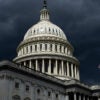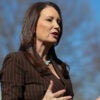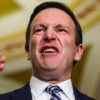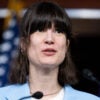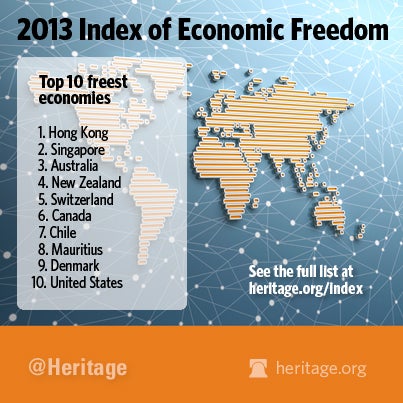When we talk about “economic freedom,” what do we mean—and why does it matter?
Economic freedom is the fundamental right of every human to control his or her own labor and property. In an economically free society, individuals are free to work, produce, consume, and invest in any way they please, with that freedom both protected by the state and unconstrained by the state.
Since reaching a global peak in 2008, sadly, economic freedom around the world has continued to stagnate.
The Daily Signal depends on the support of readers like you. Donate now
Today launches the 19th edition of the Index of Economic Freedom, produced by The Heritage Foundation and The Wall Street Journal. The 2013 Index was edited by Ambassador Terry Miller, director of Heritage’s Center for International Trade and Economics; Kim Holmes, Ph.D., Heritage’s Distinguished Fellow; and Edwin J. Feulner, Ph.D., Heritage’s president.
What are the reasons for the worldwide sluggishness? As Ambassador Miller writes in The Wall Street Journal, “Particularly concerning are the rise of populist ‘democratic’ movements that use the coercive power of government to redistribute income and control economic activity.”
While “corrupt political and legal environments cause underdevelopment in poorer countries,” Miller writes, “unfortunately, economic favoritism and cronyism exist in advanced democracies, too.” Americans are well aware, and the overall U.S. score has been dropping since 2009. From 2009 to 2010, the U.S. declined from being a “free” economy to “mostly free.” This year, it ranks 10th in the world.
One reason for America’s lack of freedom is that its scores on regulatory efficiency—which include business freedom and labor freedom—have dropped. The editors point to the fact that “over 100 new major federal regulations have been imposed on business operations since early 2009 with annual costs of more than $46 billion.”
Miller explains that what happens in Washington affects not only every corner of America, but of the world:
It is no exaggeration to blame the recent slowdown in economic liberalization around the world on the lack of U.S. leadership. Trade flows—the engine of world growth—have declined as the U.S. economy has stagnated. Protectionism threatens consumers and businesses with higher costs and restrictions in supply. Ill-conceived banking regulations such as the Dodd-Frank law generate uncertainty and anxiety. And investment freedom declines in the face of higher costs and new legal and tax liabilities such as those introduced by ObamaCare. These misguided U.S. policies hurt Americans first, but others feel the harm as well.
North America continues to be the world’s freest region, though Mexico was the only economy that improved its Index score over the last year. The region boasts two “mostly free” economies (Canada and the United States) and one “moderately free” economy (Mexico). It leads the world in terms of rule of law, regulatory efficiency, and open markets, but is getting worse where government spending is concerned.
About the Index
Launched in 1995, the Index evaluates countries in four broad areas of economic freedom: rule of law; regulatory efficiency; limited government; and open markets. Based on an aggregate score, each of 177 countries graded in the 2013 Index was classified as “free,” “mostly free,” “moderately free,” “mostly unfree,” or “repressed.”
The broader areas are broken down into 10 measures: property rights, freedom from corruption, fiscal freedom, government spending, business freedom, labor freedom, monetary freedom, trade freedom, investment freedom, and financial freedom.
The New Website
The updated website, launched today, is interactive:
- Compare up to three countries of your choice on all 10 measures of economic freedom with an interactive, color-coded chart feature.
- See a colorful heat map of the spread of economic freedom around the world, or select a specific region.
Each country’s profile includes quick facts such as its population, gross domestic product (GDP), unemployment rate, and the amount of foreign investment flowing into the country—and you can embed this data in your blog or website.
Visit the 2013 Index of Economic Freedom
Quick Hits:
- Yesterday, Vice President Joe Biden said that the President was considering executive orders to take action on gun control.
- China appears poised to test an anti-satellite missile.
- The Manhattan Institute presents its Urban Innovator Award today to New York City’s Robert Doar for his work challenging the culture of dependency and the problem of fatherlessness.
- The flu has hit hard in Boston, where at least 700 people have fallen ill and four elderly residents have died.
- The editorial board of The Washington Post agrees that Medicare needs serious reforms. Heritage’s Bob Moffit has details.


